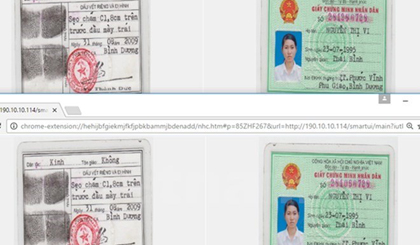Mobile users must submit photo
Two almost identical ID cards with different identity numbers. Several mobile accounts are sometimes registered with the same ID photo. (Photo courtesy of the Ministry of Information and Communications)
Mobile phone users must submit portrait photos when registering for accounts, an official from the Ministry of Information and Communications (MIC) said.
Le Thi Ngoc Mo, deputy director of the Vietnam Telecommunications Authority (VNTA) under MIC, was reacting to public concern generated by a recent decree requiring photos together with ID cards when registering for mobile accounts (SIM cards).
She said "the requirement is reasonable since it will help limit scam text messages and spread of false information, ensuring national security and social order and safety".
 |
Identity verification techniques are necessary since ID cards and their photocopies can be fabricated, according to Mo.
Electronic database that contain citizens’ information have been established in Germany, the US, and Japan so that authorities can double-check information on their ID cards when they register for mobile accounts.
Other countries, such as India, Thailand, Pakistan and Bangladesh have launched fingerprint recognition systems, and Nigeria – apart from utilising such a system – has also requested citizens to submit portrait photos of themselves when registering for mobile accounts.
VNTA figures show that as of the beginning of 2016, 80 million out of 120 million mobile accounts did not match the information on their ID cards despite strict regulations. Fake details on name, age, date of birth, and ID number were discovered. In some cases, identity information of mobile users showed up on mobile accounts that were not theirs.
Citizens’ portrait photos, therefore, would be their most credible evidence of identity, which would prevent mobile users from using identity documents of one person to register for different mobile accounts, Mo said.
When the new requirements took effect last April, telecommunication service providers were given 12 months to review their users’ databases and inform users with inaccurate information to re-register their mobile accounts.
Comparing the photo requirement to the fingerprint requirement in some countries, Mo said it is more feasible, since the process of retrieving users’ fingerprints is much more complicated and requires huge equipment investments.
It is understandable that citizens had negative reactions to the photo requirement when it first came out because they thought it would invade their privacy, but in fact, it is no more trouble than presenting only their ID cards, according to her.
Moreover, apart from their fixed service delivery points, telecommunication service providers are allowed by regulations to establish mobile service delivery points, where citizens can easily submit their photos, she added.
"Citizens will come to terms with the new requirement if service providers are willing to enforce it," she said.
(Source: VNA)
 về đầu trang
về đầu trang






